A die was thrown 60 times with the following results: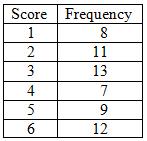
What was the relative frequency for a score of six?
Note: Write answer in decimal
RF( of scoring of six)
= 12/60
= 1/5
= 0.2
What is relative frequency
Relative frequency is calculated after an experiment is conducted. It is calculated on the basis of the testś results.
Formula of relative frequency
Successful outcomes/ Total outcomes
If a survey was taken of 50 student where 25 students responded, Find the response rate of the students responded.
125%
With the help of List method write the sample space of it?
S = {1A, 1B,1C, 2A, 2B, 2C, 3A, 3B, 3C, 4A, 4B, 4C}
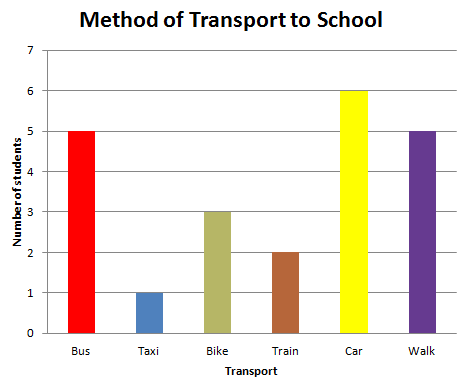
The bar graph shows the usual method of transport to school for the students in a class.
What is the relative frequency for traveling to school by car?
(You may use a calculator)
The total number of students
= 5 + 1 + 3 + 2 + 6 + 5
= 22
Just add up the heights of all the bars.
Of these, 6 students travel to school by car.
So the relative frequency for traveling to school by car = 6/22 = 0.27 (to 2 decimal places)
What is theoretical probability ??
Theoretical probability is calculated before an experiment has been performed or an event has occurred.
Formula of response rate
No. of respondents/ No. of people sampled
If there were 1000 people surveyed to find the unique mails where only 70 responded, Find the response rate of it?
Will the response rate be less or more ?
Less, 7%
Bag A contains 10 marbles of which 2 are red and 8 are black. Bag B contains 12 marbles of which 4 are red and 8 are black. A ball is drawn at random from each bag.
a) Draw a probability tree diagram to show all the outcomes the experiment.
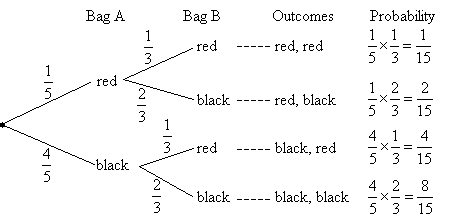
This pie chart shows the McCreedy's household expenditure, broken down into categories: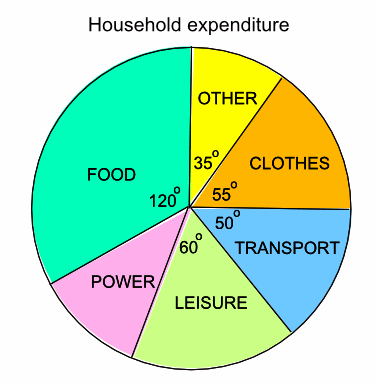
What is the relative frequency for the category 'clothes'?
(You may use a calculator)
The angle for clothes is 55° and the total angle at the center of the pie chart is 360°
So the relative frequency for 'clothes' = 55/360 = 0.153 correct to 3 decimal places.
What is response rate ??
Response rate determines the activeness of the audience.
Complementary events
1 - P(A)
For example, if u are taking a survey of 1500 people to check the medical reports of every family to get know that the family is infected by COVID or not. Hence, when u got all the report u got that only 500 responded. What is the response rate ??
33.33%
Bag A contains 10 marbles of which 2 are red and 8 are black. Bag B contains 12 marbles of which 4 are red and 8 are black. A ball is drawn at random from each bag.
(i)Find the probability of both the marbles are red.
The probability that:
(i) both are red.
P(R, R) = ![]()
The following table shows the sales of DVD players made by a retail store each month last year: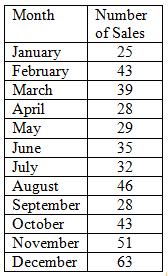
What was the relative frequency for the last three months of the year?
(You may use a calculator)
The total annual sales are found by adding all the monthly sales together
= 25 + 43 + 39 + 28 + 29 + 35 + 32 + 46 + 28 + 43 + 51 + 63
= 462
The number of sales for the last three months = 43 + 51 + 63 = 157
So the relative frequency for the last three months = 157/462 = 0.34 (to 2 decimals)
What is Sample Space
The set of all possible outcomes of a random Experiment is called as Sample space. It is denoted by capital letter ‘S’.
Can response written in decimals ?
True or False
False
Why should response rate written in %
A survey's response rate is the percentage of people who completed the survey compared to the number of people who viewed or started it.
Bag A contains 10 marbles of which 2 are red and 8 are black. Bag B contains 12 marbles of which 4 are red and 8 are black. A ball is drawn at random from each bag.
Find the probability of both the marbles are black.
P(B, B) = ![]()
Relative frequency is also known as ??
Experimental probability
he sample space when rolling one die is
{1, 2, 3, 4, 5, 6}
Can probability be written in negative(-) ?
No
Is response every time estimated ?
No, it differs in some cases due to finding the answers in non-terminating decimals.
Bag A contains 10 marbles of which 2 are red and 8 are black. Bag B contains 12 marbles of which 4 are red and 8 are black. A ball is drawn at random from each bag.
Find the probability of one black marble and one red marble.
P(R, B) or P(B, R) = ![]()